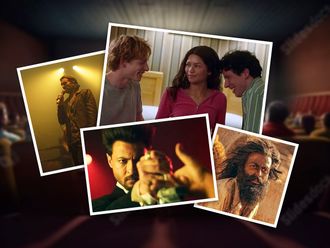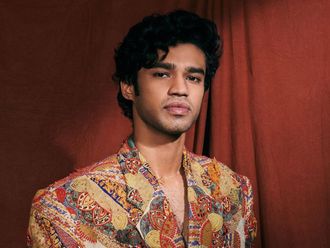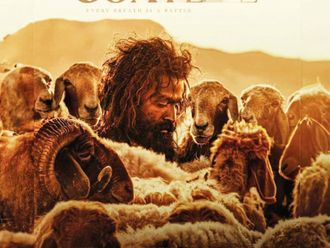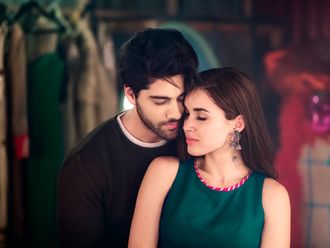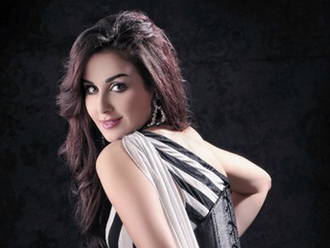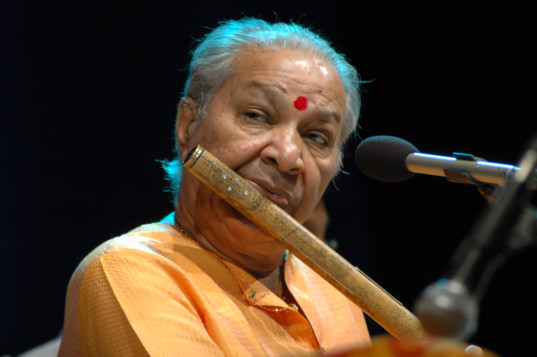
Pandit Hariprasad Chaurasia is no stranger to Dubai. Not only has he been here several times, each time he has wowed the audience. And once again, on Friday September 26, he will bring his melodious flutes to Dubai.
With awards such as the French Ordre des Arts et des Lettres (2009) under his belt, Chaurasia has collaborated with not just Indian music heavyweights such as Shivkumar Sharma and the recently deceased mandolin maestro U Srinivas, but international stars such as John McLaughlin, Jan Garbarek and Ken Lauber and played on The Beatles 1968 B-Side The Inner Light written by George Harrison. He has also composed for Bollywood films such as Chandni, Darr, Lamhe and Silsila with Sharma.
Yet he seems to be just the simple, modest, down-to-earth wrestler his father taught him to be. Having lost his mother when he was six, he pleased his father by following his footsteps in the wrestling arena but gave way to his passion for music at the age of 15 with the help of his neighbour Pandit Rajaram from whom he learnt vocal music. Pandit Bholanath Prasanna of Varanasi was the one who taught him to play the flute. But it’s Annapurna Devi, a sitar player who was married to Pandit Ravi Shanker, he credits as his Guru Ma (teacher).
“She is my inspiration,” Chaurasia told tabloid!. “She is an ocean of knowledge. If I could inculcate even a handful of her teachings, I would consider myself worthy”.
Chaurasia will perform at Elements – Vayu (wind) at Madinat Jumeirah. He will be joined by percussionists Pandit Bhawani Shanker on the pakhwaj and Pandit Subhakar Banerjee on the tabla.
Excerpts:
Tell us what the audience can expect this time around.
I have always enjoyed playing in Dubai. Its cosmopolitan audience is very receptive and appreciative. This time too I’m looking forward to it with something new.
We’ve just lost one of our legendary musicians, U. Srinivas. Plus there’s a distinct lack of enthusiasm in the Indian youth regarding classical music.
Do you think the genre will end with this generation as we have very few good musicians/singers after legends such as yourself, Pandit Shivkumar Sharma, Pandit Jasraj etc?
[The death of U. Srinivas] is most shocking news. I spoke to him just 10-12 days ago regarding Shree Satya Sai Baba’s centenary birthday celebrations where he wished me to participate. He was such a talented musician but so humble and simple, always smiling. It’s a great loss to Indian classic music.
I’m very optimistic about the current generation of musicians. They are extremely dedicated and doing a wonderful job. I don’t think there is a lack of interest. Maybe they are distracted by other means and modes of experimentation, but, eventually, they will come back to their roots.
You’ve been on the international collaborative music scene for a long time now. How do you think the scene has changed aesthetically over the years? Also, has the use of technology created a difference, favourably or adversely?
I have always enjoyed collaborating with other musicians, both Indian and international. It’s a great way to learn and be inspired by their music and talent. I have gained a lot through each and every collaboration. Previously, it was not very common. We used to experiment. It was important to spend time with [the other artists], understand their music and involve them in our repertoire. But now with the world becoming so compact, everything is at our fingertips. You can be in different continents and yet collaborate with each other through technology. Also the instruments and sound techniques have improved a lot, making it all very smooth and feasible.
We all know wind instruments use more energy to play. How, at the age of 76, do you manage to keep yourself so fit as to perform for hours?
Playing the flute is like yoga — pranayam (breathing exercises). You are breathing into the instrument, with great control. I also think it’s my father’s blessing. He was a wrestler and during my childhood insisted on strict discipline, a diet laden with milk and ghee (clarified butter) and regular daily wrestling practice. Despite hating it secretly, I had to endure those painful sessions. But now, in retrospect, I think it was a blessing in disguise because of that discipline I am able to handle the flute even at this age.
You have also given music in films such as Chandani, Darr, Silsila, etc. Today, it seems the industry follows the mantra “anything that sells is good music”. What do you think are the elements of a good song, apart from good composition?
It’s not fair to compare our times with the present times. These days, people are in great competition, under stress to perform and produce results. I agree that not all music is soulful but there are sparks of talent who shine.
A good song is a result of team effort: appropriate lyrics, soulful music, talented singers, a sensitive director and talented actors who portray it on the screen. The story and background of the song should also be relevant — not to just to sell a film.
Tell us about some of your favourite moments in a career spanning almost 60 years.
I am thankful to God for being so kind to me, for giving me [an instrument such as] the bansuri [flute] to play. I am most grateful to Him for showing me the path to my Guru Ma’s teachings and for the love and admiration that I get from all of you.
The most cherished moment of my life was when my Guru Ma Smt Annapurna Devi accepted me as a disciple. It was the greatest award/reward I could ever get. Every teaching that I received from her — about life, music and beyond — is most cherished.
Also the day my dream project Vrindaban Gurukul became a reality was an important day. I had always envisioned a gurukul (educational institute) where students could be taught in the traditional style of guru-shishya parampara (teacher-student style). It finally saw the light of the day thanks to believers such as [former Indian prime minister] late Rajiv Gandhi and [industrialist] Ratan Tata, amongst other patrons.
What would be your advice to young music students?
Never give up learning. Remain a student throughout your life. There’s so much the world has to offer, take it with sincerity and dedication. Also it’s very important to be respectful to your guru and to your parents. It is their blessings that will help you achieve everything that you desire and deserve in life.


